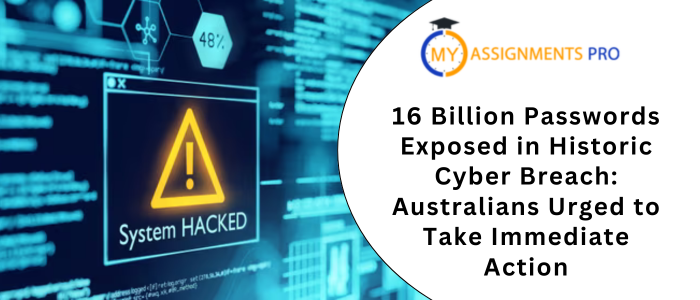
In what is now being dubbed the most significant data breach in internet history, a colossal 16 billion passwords from some of the world’s most-used platforms—Apple, Facebook, Google, and even US government services—have been leaked online. The scale of this cyber disaster has triggered global alerts, and Australians are being urged to act fast to secure their digital identities.
Cybersecurity researchers from Cybernews, the investigative team behind the discovery, revealed that the breach included 30 massive datasets, each containing anywhere from tens of millions to more than 3.5 billion login records. Experts warn that this data isn’t just old leaks being recirculated—it’s largely new and previously unreported information.
“This isn’t just a leak,” the researchers told Forbes. “It’s a blueprint for mass exploitation.”
Australians at Risk: What’s Been Exposed?
While the breach originated from international systems, the impact is truly global—including in Australia. Cybercriminals don’t discriminate by geography. If you’ve used major platforms like Apple, Facebook, Google, GitHub, or Telegram—or any services that require a login—there’s a real chance your data could be part of this breach.
The leaked data reportedly contains URLs, usernames, email addresses, and passwords, making it easier than ever for hackers to access anything from personal emails to cloud storage and financial platforms.
Australian government services haven’t been directly named in the breach yet. However, given the interconnected nature of online accounts and the use of shared passwords across different platforms, Aussie users are just as vulnerable to potential misuse.
What Caused the Breach?
Investigators believe the leak is the result of multiple infostealers—malicious software programs that infect computers and mobile devices to extract saved passwords and login credentials. These types of malware typically spread through phishing emails, malicious links, or even pirated software downloads.
The data appeared online briefly on a hacker forum, just long enough to be picked up by researchers. However, it vanished too quickly for authorities to track down the original source.
“These aren’t recycled leaks from years ago,” the Cybernews team stated. “This is fresh, weaponisable intelligence at scale.”
Google & FBI Sound the Alarm
In response, Google has issued an urgent call to its global user base, urging billions of users to change their passwords immediately, especially if they haven't done so recently.
Simultaneously, the US Federal Bureau of Investigation (FBI) has also stepped in, issuing public warnings against opening suspicious SMS links, a common tactic used by scammers in the aftermath of data leaks.
This move has prompted Australia’s own cybersecurity watchdogs to raise awareness and advise everyday users to take precautionary measures.
How Can Aussies Protect Themselves?
Given the magnitude of the breach, there’s no room for complacency. Cybersecurity experts are advising Australian users to:
1. Change Your Passwords Immediately
Start with major accounts—especially Google, Facebook, Apple ID, banking platforms, and government portals like myGov. Use strong, unique passwords for each.
2. Use a Password Manager
Password managers like LastPass, 1Password, or Bitwarden can help generate and store complex passwords safely. These tools also flag reused or compromised passwords.
3. Enable Two-Factor Authentication (2FA)
This adds an extra layer of security, even if someone has your password. Use 2FA wherever possible—email, banking apps, social media, and more.
4. Monitor for Unusual Activity
Check your bank accounts, emails, and social media profiles regularly for strange activity. Emails asking to reset your password or unfamiliar logins could indicate that someone’s already trying to get in.
5. Beware of Phishing Attempts
Hackers often use data leaks to launch phishing attacks. Be cautious of emails or SMS messages asking for your details, especially if they claim to be from banks, ATO, or other official bodies.
Don’t Rely on Just One Layer of Protection
One of the biggest risks in Australia—and globally—is the habit of reusing passwords across multiple accounts. If one account is breached, hackers can try the same credentials elsewhere, a method called “credential stuffing”.
Let’s say you use the same password for Facebook and your email. If Facebook is hacked, cybercriminals now have easy access to your inbox—and potentially other linked accounts like Netflix, online banking, or even myGov and Medicare.
The Bigger Picture: Why This Matters to Australia
Australia has witnessed a wave of major cyber incidents in the last few years. From the Optus and Medibank breaches in 2022 to ongoing phishing scams targeting Centrelink and ATO users, it’s clear that no one is immune.
This latest breach only compounds the problem, adding fresh ammunition for hackers to exploit people across the globe, including here at home.
Cybercrime has become Australia’s most reported crime category, according to the Australian Cyber Security Centre (ACSC). In fact, a cybercrime is reported roughly once every six minutes, and this number is only expected to rise in the wake of the latest breach.
What Should Businesses Do?
It’s not just individuals at risk. Small businesses, educational institutions, and non-profits across Australia must also bolster their defences.
- Ensure staff use secure, unique passwords.
- Enforce regular password updates and training on phishing awareness.
- Back up critical data and consider cybersecurity insurance.
In short, this breach is a wake-up call for both individuals and organisations to take their digital hygiene seriously.
Final Thoughts: Stay Vigilant
We live in a world where digital identity is as valuable as physical assets. With 16 billion passwords now potentially in the wrong hands, it’s crucial for Australians to treat this breach seriously.
While there’s no way to undo the leak, you can control how vulnerable you remain moving forward.
Take the time today to review your passwords, secure your accounts, and adopt safer online habits. It’s better to be proactive now than face devastating consequences later.
Affordable & Trustworthy Assignment Help Tailored for Students
Struggling with tight deadlines or challenging coursework? My Assignments Pro is here to guide you through every step of your academic journey. We offer personalised assignment help across a wide range of subjects, including business, law, nursing, finance, and more. Our expert writers deliver original, thoroughly researched work that aligns with your university’s standards. With on-time delivery, budget-friendly rates, and exclusive discounts on bulk orders, we’re your reliable partner for everything from essays and reports to detailed technical assignments.
Source
Mitchell
Mitchell is a seasoned Ph.D. scholar with extensive expertise gained through years of rigorous research, publication, and teaching experience. He brings a wealth of knowledge and analytical skills to tackle complex academic challenges. His work is dedicated to delivering innovative solutions, advancing knowledge, and promoting academic excellence. Proficient in research methodology, data analysis, and scholarly writing, Mitchell has contributed to peer-reviewed journals and mentored students to achieve academic success.


